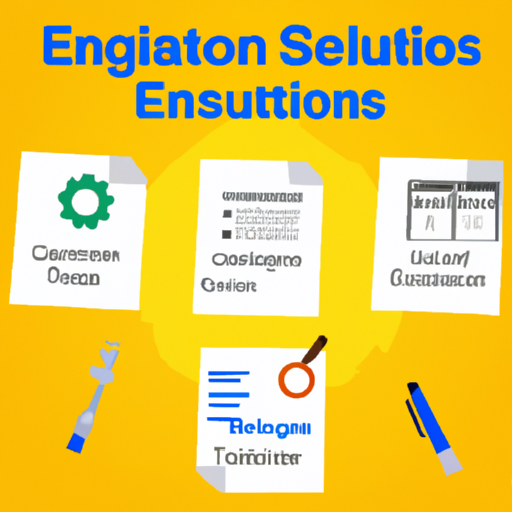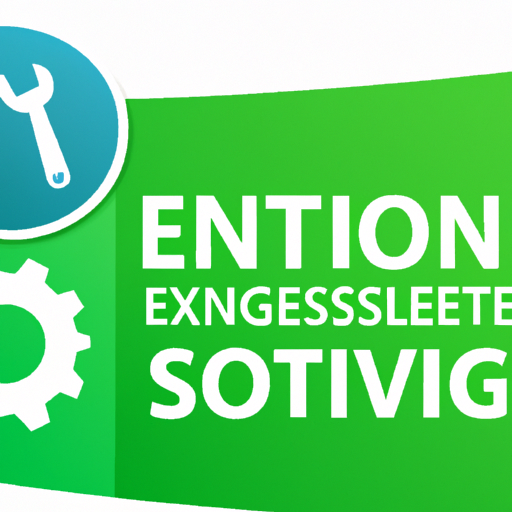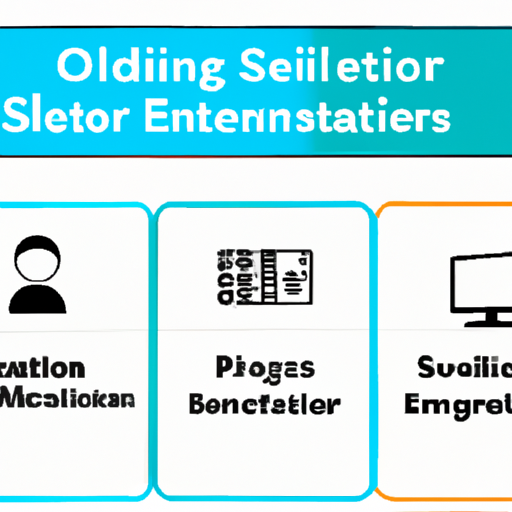The rapidly evolving technological landscape has brought about a demand for individuals who possess a unique blend of technical expertise and exceptional communication skills. Enter the Solutions Engineer – a role instrumental in bridging the gap between complex technical solutions and the practical needs of customers. In this article, we delve into the details of the Solutions Engineer job description, exploring the essential skills, responsibilities, and qualifications required to excel in this influential position. Whether you aspire to become a Solutions Engineer or seek a deeper understanding of this vital role, this article aims to provide valuable insights into the world of solution engineering.
Table of Contents
- Overview of the Solutions Engineer Role
- Essential Skills and Qualifications for a Solutions Engineer
- Responsibilities and Duties of a Solutions Engineer
- The Value of Problem-Solving Skills for a Solutions Engineer
- Collaboration and Communication in the Solutions Engineer Role
- Technical Knowledge and Expertise Needed as a Solutions Engineer
- Best Practices for Success as a Solutions Engineer
- The Importance of Continuous Learning in the Solutions Engineer Field
- To Conclude

Overview of the Solutions Engineer Role
A Solutions Engineer is a crucial role within any organization, responsible for bridging the gap between technical expertise and client-facing communication. These professionals possess a unique blend of technical knowledge, problem-solving skills, and strong interpersonal abilities. As a Solutions Engineer, you will play a key role in understanding customer needs, designing tailored solutions, and providing technical guidance to ensure successful implementation.
In this role, you will collaborate closely with cross-functional teams, including Sales, Product Management, and Development, to gather requirements, identify opportunities, and propose optimal solutions that align with clients’ objectives. Leveraging your expertise, you will craft detailed technical proposals and deliver presentations to both technical and non-technical stakeholders. You will act as a trusted advisor, conveying the value proposition of the organization’s products or services, resolving technical inquiries, and providing ongoing support throughout the entire customer journey.
Key Responsibilities:
- Technical Expertise: Deep understanding of the organization’s product offerings and the ability to communicate complex technical concepts to various audiences.
- Solution Design: Collaborate with clients to identify requirements, customize solutions, and create detailed technical proposals.
- Customer Support: Offer ongoing technical guidance, address inquiries, and provide solutions to ensure customer success.
- Relationship Management: Foster positive relationships with clients, acting as a trusted advisor and advocating for their needs internally.
- Continuous Improvement: Stay up to date with industry trends, new technologies, and product enhancements to continuously enhance proposed solutions and increase customer satisfaction.

Essential Skills and Qualifications for a Solutions Engineer
Solutions Engineer Job Description
As a solutions engineer, possessing a diverse skill set is crucial to excel in this role. Successful candidates will possess the following essential skills and qualifications:
1. Technical expertise:
- Proficient in programming languages such as Java, C++, or Python.
- Familiarity with cloud computing platforms like AWS or Azure.
- Deep understanding of software development methodologies and tools.
2. Problem-solving abilities:
- Analytical mindset with strong problem-solving skills to identify and resolve complex technical challenges.
- Ability to think on your feet and provide creative solutions that meet client requirements.
- Capacity to troubleshoot software issues and offer prompt resolutions.
Solutions engineers play a pivotal role in bridging the gap between customer needs and product capabilities. They collaborate closely with clients, sales teams, and product managers, utilizing their exceptional communication and interpersonal skills.

Responsibilities and Duties of a Solutions Engineer
As a Solutions Engineer, you will play a vital role in the success of our organization. Your primary responsibility will be to collaborate with customers and internal teams to design, develop, and implement innovative solutions that meet their unique business needs. You will serve as a trusted advisor, leveraging your technical expertise and industry knowledge to understand customer requirements and recommend appropriate solutions.
Specifically, your duties will include:
- Conducting comprehensive analyses of customer requirements to develop tailored solutions
- Designing and presenting technical solutions to customers, ensuring alignment with their goals and objectives
- Collaborating with cross-functional teams, including Sales, Product Management, and Engineering, to deliver integrated and effective solutions
- Providing technical guidance and support throughout the implementation and deployment process
- Ensuring customer satisfaction by addressing any technical issues or concerns in a timely and efficient manner
To excel in this role, you must possess strong problem-solving skills, excellent communication abilities, and a deep understanding of software engineering principles. Your attention to detail and ability to manage multiple projects simultaneously will be crucial in meeting customer expectations and driving overall customer success.
The Value of Problem-Solving Skills for a Solutions Engineer
For a Solutions Engineer, problem-solving skills are not just an asset, but a crucial requirement. This role demands the ability to analyze complex issues, develop innovative solutions, and implement them effectively. A Solutions Engineer must have a deep understanding of both technical and business aspects, enabling them to bridge the gap between clients’ needs and the solutions offered by the company.
Being a Solutions Engineer means constantly facing challenges and obstacles that require quick thinking and a methodical approach. This role demands proficiency in critical thinking and logical reasoning to identify the root causes of problems and devise efficient strategies to address them. Whether it’s debugging software issues, optimizing system performance, or integrating different technologies, problem-solving skills are at the core of a Solutions Engineer’s job.
Moreover, a Solutions Engineer should possess excellent communication skills to collaborate with cross-functional teams and clearly articulate solutions to technical and non-technical stakeholders. This includes the ability to listen actively, ask the right questions, and present complex technical concepts in a concise and easily understandable manner. Adaptability and a customer-focused mindset are also essential qualities for a Solutions Engineer, as they must be able to adapt their problem-solving approach to various scenarios and tailor solutions to meet specific client requirements.
In summary, problem-solving skills are not just a valuable asset for a Solutions Engineer, but an indispensable tool to excel in this role. With a strong blend of technical expertise, analytical thinking, and effective communication, a Solutions Engineer can navigate the complexities of modern technology landscapes and deliver innovative solutions that drive business success.
Collaboration and Communication in the Solutions Engineer Role
In the fast-paced world of technology, effective collaboration and communication are essential skills for a Solutions Engineer. As a Solutions Engineer, you will be responsible for bridging the gap between the technical and non-technical teams, facilitating seamless communication to ensure the successful implementation of solutions. You will serve as the primary point of contact for clients, internal teams, and stakeholders, acting as a liaison to understand their requirements and provide technical expertise.
Within the Solutions Engineer role, collaboration takes center stage. You will work closely with cross-functional teams, such as Product Managers, Developers, and Sales Representatives, to gather insights and share technical knowledge, ensuring a comprehensive understanding of project objectives. Through regular meetings, brainstorming sessions, and information exchanges, you will actively contribute to the development and refinement of solutions, striving for innovative approaches and problem-solving techniques.
Technical Knowledge and Expertise Needed as a Solutions Engineer
- Extensive understanding of software development principles and methodologies
- Proficient in various programming languages such as Java, C#, Python, or Ruby
- Deep knowledge of database management systems, such as SQL and NoSQL
- Experience working with cloud platforms like AWS or Azure, and familiarity with DevOps practices
- In-depth understanding of networking concepts, protocols, and security
A Solutions Engineer must possess a strong foundation in systems architecture and design, being able to analyze complex requirements and architect effective solutions. This involves:
- Ability to gather and assess customer requirements, translating them into technical specifications
- Designing and implementing scalable and reliable solutions based on customer needs
- Collaborating with cross-functional teams to ensure seamless integration of various technologies
- Providing ongoing technical support and troubleshooting throughout the project lifecycle
Best Practices for Success as a Solutions Engineer
As a solutions engineer, there are several best practices that can greatly contribute to your success in this role. These practices not only enhance your technical skills but also help you develop strong relationships with clients and ensure the successful implementation of solutions.
1. Continuously expand your technical knowledge: Keep up-to-date with the latest technologies, tools, and industry trends relevant to your field. This allows you to offer innovative solutions and stay ahead in a rapidly evolving industry. Attend relevant conferences, webinars, and workshops, and actively engage with the technical community to expand your knowledge and learn from others’ experiences.
- 2. Understand each client’s unique needs: Take the time to fully understand your clients’ requirements and challenges before proposing solutions. Conduct detailed discovery sessions, ask probing questions, and listen attentively to their concerns. This will help you tailor your solutions to their specific needs and increase the chances of successful implementation.
- 3. Foster strong relationships: Building trust and maintaining strong relationships with clients is crucial for success as a solutions engineer. Establish open lines of communication, be responsive to their queries and concerns, and provide timely updates on progress. Regularly engage with clients to gather feedback and assess their satisfaction levels. A satisfied client is more likely to recommend your expertise and services to others.
- 4. Collaborate with cross-functional teams: Solutions engineering often involves working with various teams such as sales, development, and support. Collaborate effectively with these teams, share information, and foster a culture of teamwork. This ensures a smooth handoff process and avoids any gaps or miscommunications during the implementation phase.
By following these best practices, you can excel as a solutions engineer and deliver exceptional results for your clients. Remember, success in this role not only relies on technical expertise but also on effective communication, relationship building, and adaptability to changing technology landscapes. Continuously strive to expand your skill set and provide value to your clients, and success will surely follow.
The Importance of Continuous Learning in the Solutions Engineer Field
Continuous learning is a crucial aspect of success in the ever-evolving field of Solutions Engineering. As technology continues to advance rapidly, staying up-to-date with the latest tools, techniques, and industry trends is essential for solutions engineers to provide optimal solutions to clients. By investing time and effort into continuous learning, solutions engineers can gain a competitive edge, enhance their problem-solving abilities, and broaden their skillset.
One significant advantage of continuous learning for solutions engineers is the ability to stay abreast of emerging technologies. As new software, hardware, and methodologies are introduced, it is essential for solutions engineers to keep their skills current. Continuous learning allows them to understand and implement advanced tools and technologies that can help them design innovative and efficient solutions for clients. Furthermore, by staying updated on industry trends, solutions engineers can adapt their approaches and strategies accordingly, ensuring their solutions align with the changing needs and expectations of their clients.
To facilitate continuous learning, solutions engineers can attend industry conferences and workshops, pursue certifications, participate in online courses, and collaborate with colleagues. These activities not only provide access to valuable resources and knowledge but also enable solutions engineers to network with industry experts and gain insights from their experiences. Additionally, engaging in continuous learning fosters a growth mindset, encouraging solutions engineers to constantly challenge themselves, seek new opportunities, and explore different avenues for personal and professional development. As an integral component of the Solutions Engineer field, continuous learning is not just advantageous for individual solutions engineers, but it also enables the field as a whole to progress and adapt to the ever-changing technological landscape.
To Conclude
In conclusion, the role of a Solutions Engineer holds immense significance in bridging the gap between technical expertise and business acumen. As we explored in this article, Solutions Engineers play a pivotal role in understanding and dissecting complex technical requirements, tailoring suitable solutions, and facilitating seamless implementation for clients. Their ability to effectively communicate with both technical and non-technical stakeholders allows them to bridge the gap between various teams within an organization.
A Solutions Engineer’s skill set encompasses a wide range of technical competencies, including in-depth knowledge of system architecture, proficiency in coding languages, and a strong grasp of industry best practices. Furthermore, their strong problem-solving abilities and analytical thinking enable them to devise innovative solutions to address complex business challenges.
The job description of a Solutions Engineer is dynamic and ever-evolving, as technology constantly advances and the needs of businesses continue to transform. It requires adaptability, a passion for learning, and the ability to work collaboratively with various teams. Moreover, possessing exceptional communication and interpersonal skills is essential, as Solutions Engineers often act as the main point of contact between the technical team and clients.
In addition to the technical aspect of the role, Solutions Engineers also possess a deep understanding of business processes and objectives. They strive to align technical solutions with the broader organizational goals, ensuring that the implemented systems positively impact the company’s overall success.
In conclusion, the Solutions Engineer role combines technical expertise, strong problem-solving skills, and effective communication capabilities to deliver innovative and tailored solutions for clients. This multi-faceted position offers numerous opportunities for growth and advancement within organizations across different industries. Should you possess the necessary skills and qualifications, embarking on a career as a Solutions Engineer can pave the way for a fulfilling and impactful professional journey.
